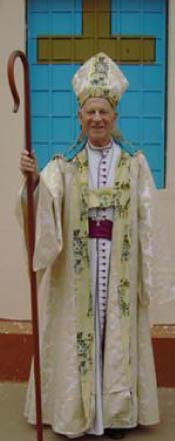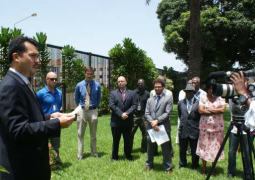
Christmas has been celebrated in The Gambia for one hundred and ninety years – indeed, every year since the first Methodist missionary, John Morgan, came in 1821. It is a joy, therefore, for me as the Presiding Bishop of the Methodist Church to wish you once more: ‘A Happy Christmas’.
At Christmas what we celebrate is the birth of a baby, not just any baby, but a baby whose birth had been foretold centuries before.
One of the wonderful marks of life in The Gambia is that Christians and Muslims can in their different ways share in and celebrate each other’s great feasts. What our Muslim brothers and sisters celebrate at Tobaski, we can also celebrate as Christians. We remember the covenant God made with Abraham, that he would be Abraham’s God, and the promise He made, that Abraham would be the father of many nations. We remember also the complete trust and confidence Abraham had in God, even though God was asking for the greatest sacrifice that Abraham could make. Through that trust in God, God fulfilled His promise. At Tobaski we called as leaders of the Christian community on the Imam Ratib and the Council of Banjul Elders to express our affection for them, our gratitude to God for the good relations we enjoy in The Gambia, and our joy in what we as Christian and Muslims have in common.
At Christmas we rejoice that Muslims can share in celebrating the birth of Jesus and indeed that the Imam Ratib at Christmas always sends us greetings from the Muslim community. In my message I want to share something of what Christmas means. My message is a message first to the Christian community, but I hope it will also help others to understand the Christian faith better.
One way of understanding Christmas is to look at the names given to the baby who was born in Bethlehem over 2000 years ago. The names our parents give us and the nick names our friends give us have a meaning. We may be given the name Fatty because we are fat, or Skinny because we are thin, or Clever Sticks because we are clever.
In the same way that we are given names which have a meaning, Jesus was given a name or indeed two names because they had a meaning. First, there was the name Immanuel, a Hebrew word which means God is with us.
Let me give you an example. Over the centuries people have wondered what the moon was like. They could see it with their eyes, but because it was so far away they could not tell what it was really like with their bare eyes. Then came telescopes. With a telescope they could learn much more about the moon. But just over fifty years ago, something altogether new happened. Instead of observing the moon, people actually went there and brought back samples of the moon. I remember reading how Professor Samuel Tolansky of Royal Holloway College in London was given 5 grammes of moon dust, just a teaspoonful of it. But in that small sample of moon dust he found fifty tiny marbles. From that tiny sample of a planet he had never visited he could tell us something of the moon’s character and origin.
It is a little like that with our knowledge of God. Over the centuries people have wondered what God is like – God who seems so mysterious and so far away. Through studying the world that God has made, people came to see something of the greatness of God as creator. And through listening to what prophets told them, they learned many things about God, and His will and purpose for us. Yet still God seemed like the moon, far away. But then on that first Christmas Day something new happened. The bible says that until then God had spoken in many ways through His prophets, but it adds that now He has spoken to us in His Son. Just as a few teaspoonfuls of moon dust transformed our knowledge of the moon, so the birth of this baby transformed our knowledge of God. As the space exploration brought the moon to us, so in the birth of Jesus God comes to us in human form. We know what God is like, because we see Him as far as human beings can see and understand Him – in Jesus. He is Immanuel, meaning God with us.
Of course, the name we know best for the baby born in Bethlehem is the other name, the name Jesus. The word Jesus comes from the Greek form of the Hebrew name Joshua. (The New Testament was written in Greek.) And the name Joshua means Jehovah (The Lord or God) is salvation or Jehovah will save.
If you read Mathew’s account of the birth of Jesus in the Holy Bible, you will read that Joseph had a dream. In it an angel told him that Mary would have a son and that Joseph was to give Him the name Jesus, ‘for He will save His people from their sins’. What does the word save mean? In the New Testament, it is used in two ways. It means to rescue or liberate, but it also means to heal or cure. You can see that we use the word ‘save’ in a similar way.
If someone is inside a house that is on fire and shouts, ‘Save me’, or if someone has fallen off a boat into the sea and shouts, ‘Save me’, or if someone is a prisoner being led off to be executed and shouts, ‘Save me’, we know what they mean. They mean, ‘Rescue me’, ‘Liberate me’, ‘Set me free’. But if someone who has been very ill says to her doctor when she is better, ‘That medicine or that operation saved me’, we know that she means, ‘It healed me; it made me well.’
The angel said that Jesus would save His people from their sins. Sin is anything we say or do or think which is against God’s will – and the root cause of sins (the things we say or do which are wrong) is our sinfulness or self-centredness. We put ourselves in the centre of our lives. What Jesus came to do is to free us from our self-centredness.
Let me give an example that may help us to understand this better. It comes from Italy and is about the Skunizzi, the name for gangs of boys who roamed the streets of Italian cities. Each gang had its own territory, and woe betide anyone trespassing on their territory. You could tell these boys by their appearance: the way they slouched, the way they spat, the way they swore, the way they begged, the way they stole. They were potential gangsters. Most people kept out of their way. But not one man. That man was Mario Borelli. He wanted to help them.
But how? In 1952 he decided he must become one of them, if he was to help them. He was a Christian priest. But one night he took off his clothes as a priest, and dressed for his new role.
He knew, when he met his first gang that night, that his new life had begun. He met a gang that was keeping warm by crouching over the hot air coming from a baker’s oven. He went up, spat in the leader’s face, and stood in the warmth. From that moment, he was by day a Christian priest, and by night one of them, a paladino, the older leader of a gang. He knew that only by becoming one of them could he understand them and help them to become real human beings, real people. Then, after he had been with them for some months, he showed them who he was. He invited them to come and live in a house with him – to live and work and play together. It was through meeting and living with him, that they began to change.
That story is a pale reflection of what happened at Christmas. Jesus become completely like us. He was born like us a helpless baby. He grew up as a boy into manhood. He lived our life under the same conditions as we live it, so that He could help us to become the kind of people God wants us to be. As we become His followers, as we join in the life of the church, that is the people who are seeking to follow Him, He can help us to become the sort of person God wants us to be.
You will celebrate Christmas in many ways. There will be parties and presents and the enjoying of special Christmas food. But amidst all the festivity, we need also to celebrate what Christmas is really about – and you can see that in those two words: Immanuel and Jesus.
Amazingly, God is not unknown and far away, He has come near to us and made Himself known in a baby with the name Immanuel – God is with us.
Moreover, He has come not to leave things in the world as they are. He has come to change us and to change the world. He is also called Jesus, Saviour. He has come to liberate us, to free us from self-centredness, to enable us become, like Him, those who live lives of love – love for God and love for our fellow men and women. He comes to us this Christmas to transform our lives and the life of our world.
As I wish you ‘A Happy Christmas’, I wish you a time of celebration and enjoyment. But even more than that, I wish you to see the amazing love of God for you and His desire for you to express that love for Him and for others in your daily life.



